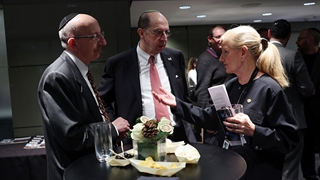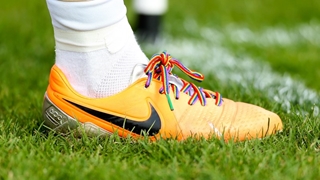
We speak to Yasir Mirza about his first year in the role as our EDI Director, his highlights so far, the Football Leadership Diversity Code, and his priorities moving forwards.
Yasir, you’ve now been in your role at the FA for over a year – can you tell us a bit more about your day-to-day activity?
That’s gone very fast, but I’m really enjoying it. My main role is to execute our current EDI strategy, A Game For All, which was first introduced in 2020, while developing our new EDI strategy that will be published later this year. On a day-to-day basis, alongside my team at the FA and our Inclusion Advisory Committee, I’m looking at how we can help to improve diverse participation across all areas of the English game. This can include working on many of our proactive EDI campaigns in collaboration with our communications and marketing colleagues, as well as developing anti-discrimination education, which is a key part of our sanctioning framework.
Naturally I keep in regular contact with our valued stakeholders across the game, such as our partners at Kick It Out, as well as the Premier League and EFL, to ensure we’re aware of each other’s campaigns or any potential issues that may have arisen. Collaboration is key in this important area of our game so that we can ensure we are aligned towards achieving the same goal.
Our overarching priority is to ensure that English football is safe and inclusive for everybody, regardless of whether they’re playing, coaching or refereeing at any level, or simply heading to stadiums to watch their favourite team with their friends and family. Everything we do as an organisation leads back to that important point. A huge number of people in this country love watching or participating in football, so English football must do everything it can to ensure they can enjoy it without fear of prejudice.
Are there any particular highlights which stand out from your first year in the role?
There’s so much that we’ve done in the last year, so it makes it difficult to narrow down. As we have access to millions of participants – and parents – through our grassroots game and our County FA network, we focus a lot of our work in promoting positive behaviours at this level of the game. With this in mind, I was really pleased to see the launch of our Enough is Enough campaign, which saw the introduction of stronger punishments, including potential point deductions at grassroots level for repeated offenders of discrimination. This really acts as a deterrent and lets clubs know that we will take action against them – as well as the individual – should any incidents of this nature occur.
We naturally have an important role to play in the professional game, and many people will have seen that we have come together with the Premier League, EFL, Barclays Women’s Super League, Barclays Women’s Championship, the National League System and other bodies in English football on the Love Football. Protect The Game campaign to tackle abuse, including tragedy chanting, and promote positive behaviours. We believe that this is having a positive effect on the game at all levels and our work in this area will continue this season.
I’m also proud of our efforts to bring faith and football closer together, with events to mark Vaisakhi, Ramadan and Chanukah at Wembley Stadium now regular dates in our calendar – and it was great to see our work in this space recognised externally at the recent Asian Football Awards.
When I joined the organisation, I was happy to see that FA colleagues had marched in Pride in London for several years, and I’m proud that this has now expanded, with many members of our workforce recently marching in Manchester Pride for the first time. Additionally, our organisation is very proactive when it comes to listening to the views and concerns of our people, with Pride and Employee Ethnicity networks in place, as well as having over 50 colleagues trained as mental health ambassadors to help support those around them as appropriate.
What I have seen over the last year, more than ever, is that football has an incredible and unique power to positively change lives and bring communities together. This motivates us each day to see how we can continue to make a difference across all levels of the game.
You mentioned the importance of working with stakeholders across the game – what does that mean in practice?
Yes, it’s important for us to work together across English football to share best practice and see how we can achieve our common goals. For me, working together is how we can have the most impact with supporters and clubs. We’ve seen this work well with the Love Football. Protect The Game campaign, from which we’re seeing clear improvements in behaviour within stadiums, as well as the Football Leadership Diversity Code, which was a significant step forward in the English game when it was introduced. As one organisation, we cannot tackle discrimination alone – we all have a very important role to play. Only by continuing to work together can we make our game truly safe and welcoming for everybody.
On the Football Leadership Diversity Code – that has now evolved. What does that look like moving forwards?
The Football Leadership Diversity Code was a landmark initiative at that time. Never before had English football come together in this way to commit to addressing the clear underrepresentation of diverse communities across senior leadership and coaching roles. We saw good progress across the three governing bodies – the FA, the Premier League and the EFL – over three consecutive seasons. We also saw many clubs really embracing the Code and driving change in their organisation. The targets were set to stretch clubs, so it’s not a huge surprise that they had mixed success. But we also found that, as the Code only showed hiring targets for the year, the results didn’t represent the actual workforce.
So, we have evolved this to now introduce mandatory diversity reporting across the English professional game, which will increase transparency and put more accountability on clubs in this area. This new FA rule requires all clubs to publish their workforce and coaching diversity data as part of the Premier League’s Equality, Diversity and Inclusion Standard and the EFL’s Code of Practice. This means, for the first time, we will be able to see the real picture of diversity across the men’s and women’s professional game for the first time.
Does that mean the Football Leadership Diversity Code has come to an end?
Yes, that’s correct – but our ambition of working with our partners across English football to build a more diverse game remains the same. The Football Leadership Diversity Code helped us to create a strong foundation, but it was never going to be a silver bullet for a challenge that spans generations, so we must evolve and focus our efforts in areas where we can help to make a real difference.
Going forward, the introduction of mandatory reporting will help to provide greater transparency and maintain the pressure for positive change, as well as ensuring English football is at the top of global industry in its levels of reporting accountability. But this is just one of many solutions that are required. We can influence the pipeline of future coaches through the grassroots game and be a good role model with the diversity of who we employ. However, we are not part of the recruitment process for professional clubs, while club academies and career transition programmes are at the gift the clubs, leagues and the PFA, so this issue is for everybody across football to influence within their remit.
Diversity Code aside, what does the future look like for The FA when it comes to equality, diversity and inclusion? Are there any specific priorities over the coming months?
A significant moment for us will be the launch of our new EDI strategy, which will be published before the end of the year. This new strategy will build on the progress made through A Game For All and will set out our focus areas for the next four years as we look to boost representation, drive inclusion and tackle discrimination across English football. Obviously, this isn’t something we can achieve alone as one organisation, but it’s important for us to communicate how we plan to use our influence as a governing body to continue to drive real change. I’m looking forward to seeing the areas of focus being put into action.












